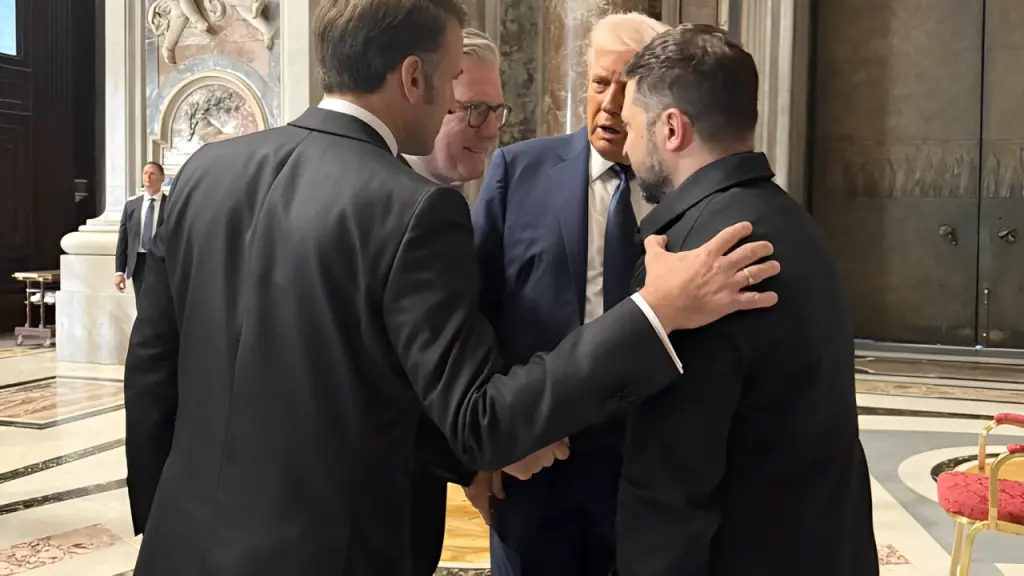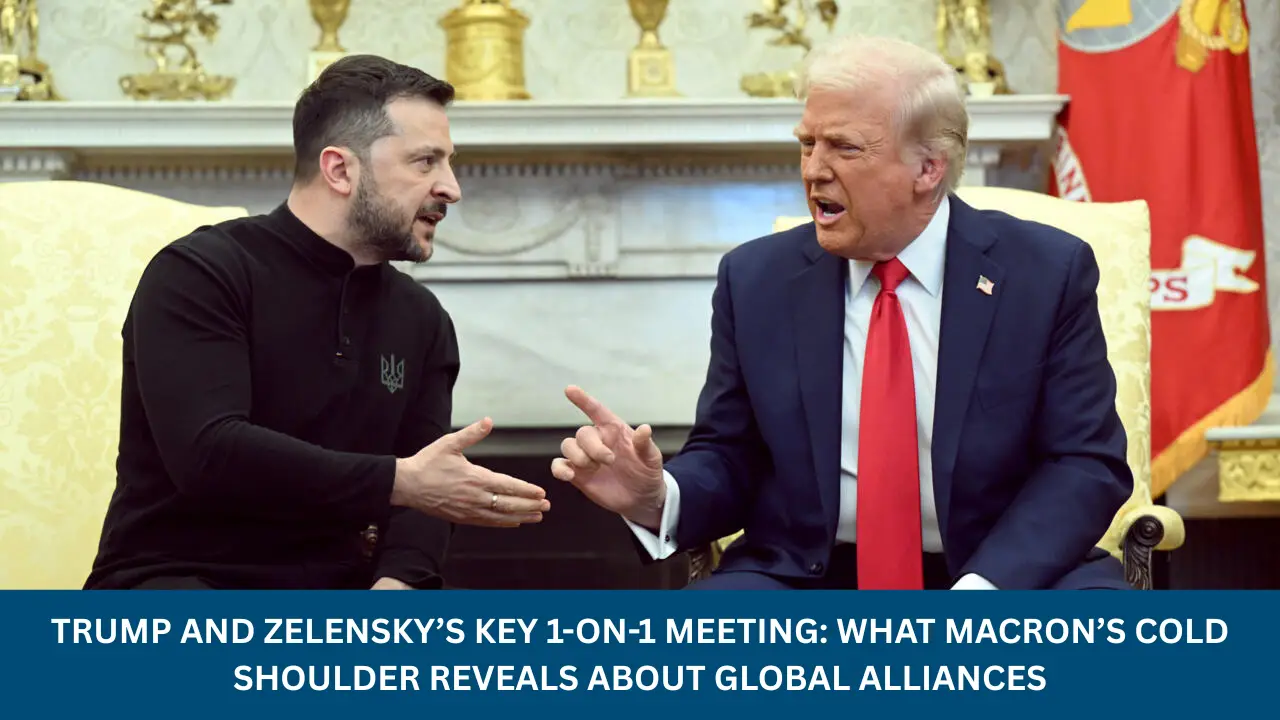A curious moment unfolded at a high-stakes global summit when a one-on-one meeting between former U.S. President Donald Trump and Ukrainian President Volodymyr Zelensky began with three chairs set up at the table.
The strange seating arrangement immediately caught the attention of attendees and diplomats alike, prompting many to wonder about the significance of such an odd setup. The situation became even more intriguing when French President Emmanuel Macron seemingly snubbed a handshake offer from both leaders, leaving everyone to speculate about the underlying tensions.
The peculiar circumstances surrounding this meeting, particularly the three chairs and the handshake snub, raised questions about the political dynamics between some of the world’s most influential leaders. While Trump and Zelensky’s discussion was intended to focus on Ukraine’s ongoing conflict with Russia, the strange interactions between Macron and the two leaders dominated headlines, overshadowing the critical topics at hand.
What Was Behind the Three Chairs?
As Trump and Zelensky prepared to meet in what was expected to be a closed-door conversation, three chairs were set up at the table. This unexpected seating arrangement left many people wondering whether Macron was originally supposed to be part of the discussion. Was there a last-minute change, or did the French president intentionally stay out of the meeting? The setup sparked confusion, especially when Macron was notably absent for the rest of the event.
The three chairs, which typically signify the presence of three individuals, suggested that Macron may have been expected to join the meeting initially. The question on everyone’s mind was whether this was a sign of a diplomatic disagreement or if it simply reflected a logistical mix-up. Many experts speculated that the three chairs were perhaps a misunderstanding or that an unspoken diplomatic message was at play.
The Macron Snub: A Deepening Rift?
Things became even more awkward when Macron appeared to avoid a handshake with Trump and Zelensky. In a highly publicised diplomatic setting, a handshake is often seen as a symbol of respect and mutual understanding. Macron’s apparent snub left many questioning the state of relations between the leaders of France, the United States, and Ukraine. Was this a deliberate political move, or was it an isolated incident driven by miscommunication?
The absence of a handshake is often interpreted as a subtle form of protest or disapproval. Macron’s refusal to engage in this seemingly simple gesture raised eyebrows and added fuel to the fire regarding tensions within the European Union’s response to the Ukraine crisis. As an influential member of the EU, Macron’s actions were closely watched by other world leaders, many of whom have been following the increasingly complex dynamics of the conflict in Ukraine.
This snub also seemed to highlight the underlying differences between Macron and Trump, particularly in their respective views on Russia’s role in the ongoing war. While Trump has been outspoken in his criticism of European leaders’ handling of the Ukraine crisis, Macron has consistently pushed for diplomatic solutions. It has taken a more cautious approach towards confrontation with Russia.
The Focus of Trump and Zelensky’s Meeting
Despite the diplomatic drama, the Trump-Zelensky 1-on-1 continued, albeit without the presence of Macron. The conversation between Trump and Zelensky centred on crucial issues related to Ukraine’s ongoing struggle with Russia. The two leaders discussed military aid, economic support, and diplomatic strategies aimed at helping Ukraine retain its sovereignty amid the ongoing war.
Ukraine’s battle against Russian aggression has drawn international attention, and leaders like Trump and Zelensky are working together to secure continued support from the West. The United States has been a significant source of military assistance to Ukraine, and Trump’s continued support has been vital in strengthening Ukraine’s position on the global stage.

However, the absence of Macron’s input raises questions about the cohesion of Europe’s response to the conflict and whether differences between European leaders and the U.S. could have lasting consequences for global diplomacy.
Though the details of the discussion between Trump and Zelensky were not fully disclosed, both leaders were quick to emphasise their commitment to Ukraine’s cause. Trump reiterated his belief in Ukraine’s ability to overcome the current challenges, while Zelensky expressed gratitude for the ongoing support from the United States.
The Growing Divide in Western Leadership
The awkward moment between Macron and Trump, along with the three-chair setup, seemed to underscore a growing divide within the Western leadership on how to handle the situation in Ukraine. While the United States has remained a strong ally of Ukraine, there are signs that some European leaders, including Macron, are adopting a more measured approach.
The incident at the summit, while seemingly small, may have far-reaching implications for the future of global diplomacy. With tensions running high in Europe due to the war in Ukraine, these moments of diplomatic friction could affect the unity of the West in the fight against Russian aggression. As the situation in Ukraine continues to evolve, world leaders will have to navigate these delicate relationships to ensure that their countries remain united in their response.
The Role of European Leaders in Ukraine’s Future
For many observers, the incident between Macron, Trump, and Zelensky was more than just an awkward moment. It highlighted the growing complexity of global diplomacy and the shifting dynamics between the United States and the European Union. As Ukraine fights for its survival, the decisions made by leaders such as Macron, Trump, and Zelensky will shape the future of not only Ukraine but also the broader international community.
While the one-on-one meeting between Trump and Zelensky may have been focused on Ukraine’s immediate needs, the diplomatic missteps involving Macron raised important questions about the role of European leaders in the crisis. Will Macron continue to push for a more cautious, diplomatic approach, or will he align more closely with the U.S. in a united front against Russia?
As the situation unfolds, these moments of tension between world leaders will continue to draw attention and spark discussions about the future of global alliances. The world is watching closely to see how these leaders navigate the complex and ever-changing landscape of international diplomacy.
Disclaimer: This article has been meticulously fact-checked by our team to ensure accuracy and uphold transparency. We strive to deliver trustworthy and dependable content to our readers.




